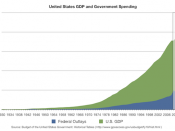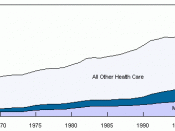US Budget Deficit 1 US Budget Deficit � PAGE �4�
US Budget Deficit
The article I read was The US Budget Deficit: On an Unsustainable Path, published in New Economy. The article was written by William G. Gale, Senior Fellow, Economic Studies and Peter R. Orszag, Senior Fellow, Economic Studies.
Since the beginning of World War II the national budget has grown immensely. But revenues have not kept up with spending, and the federal budget has had annual deficits since 1969. During the 1960s and 70s, the overall economy grew faster than the deficits. In the 1980s, however, annual deficits grew to over $200 billion. When President Bush took the reins at the White House in January 2001, budget analysts forecast annual surpluses well into the future. However, lower revenues amid economic recession and a slow recovery, large-scale tax cuts and rising government defense spending have all played a role in getting us to where we are today.
According to a forecast published in Washington by the Congressional Budget Office (CBO), the non-partisan research organization, the deficit for the fiscal year 2005 is likely to be $331bn or 2.7 per cent of Gross Domestic Product (GDP), compared with $412bn for fiscal 2004. Could you imagine if we all kept track of our personal finances that way? The Outstanding U.S. Debt as of Jan 2006 is over 8 Trillion dollars. The estimated population of the United States is about 300 million so each American citizen's share of this debt is about $28,000.00. The debt is increasing by $1.54 billion each day - that's right, each day, those are sobering facts considering that someday, somehow, We Americans are going to have to pay off all that debt.
"It took Congress 101 years to spend its first $500 billion dollars. But it...


